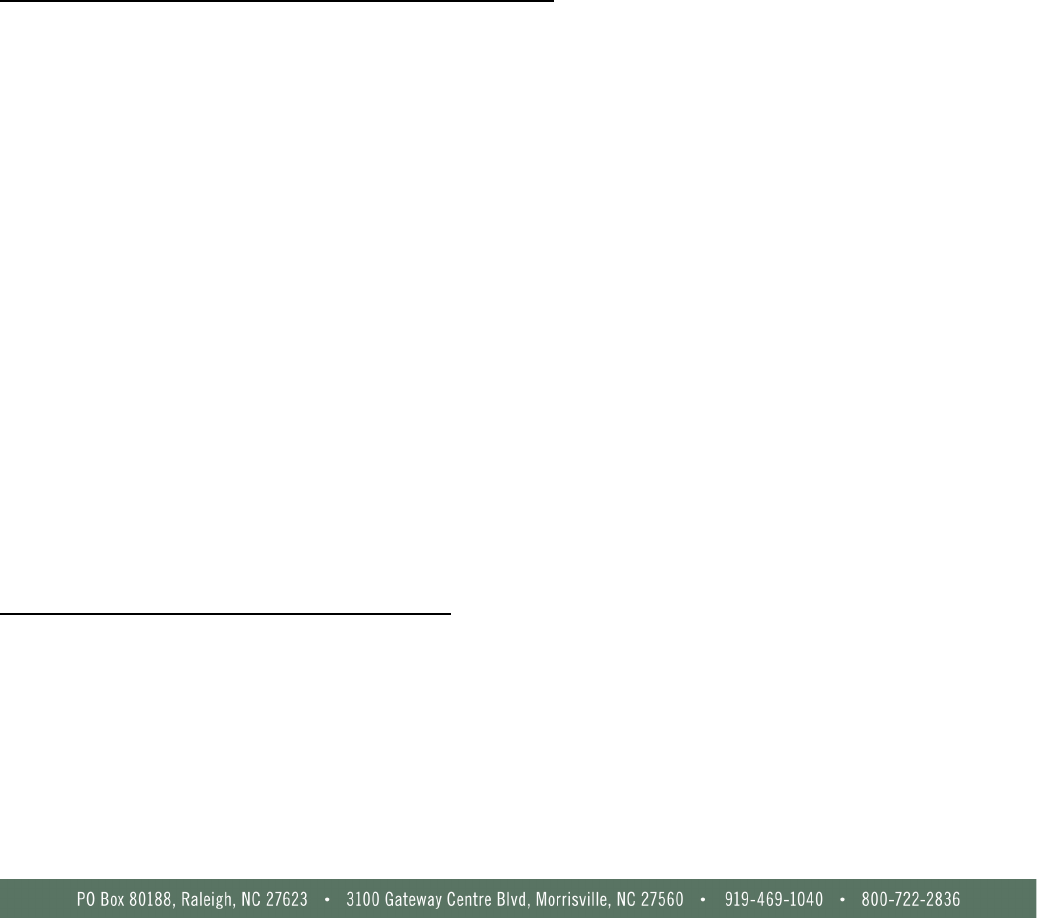
Questions for Discussion with NC Department of Revenue
Submitted by the NC Association of CPAs Committee on Taxation
and the Tax Section of the NC Bar Association
Forms, Filings, & Operational Procedures
Partnership, LLC, and Fiduciary Returns
1. When will we be able to e-file fiduciary returns?
The Department is currently testing e-File for Estates and Trusts and plans to begin testing with software
providers within the next week. We expect to open for filings in January 2021.
2. Please address the state of mandatory electronic filing of state form 1099-MISC information.
Employers and other payers who are required to or voluntarily withhold NC income taxes are required to
file the following information electronically, using the eNC3 and Information Reporting Application:
• Form NC-3
•
W-2 Statements
•
1099 Statements
However, until further notice, the Secretary of Revenue will continue the automatic waiver of the penalty
for failure to file Form NC-3 in the format prescribed by the Secretary.
3. How is this impacted by the new federal form 1099-NEC?
A payer who is required to withhold North Carolina income tax from non-wage compensation paid to a
payee, can report the non-wage compensation paid to a payee for services performed in North Carolina,
and the North Carolina tax withheld from that income, on North Carolina Form NC-1099M. (The terms
“payer” and “payee” are defined in G.S. 105-163.1.)
If a payer is required to complete a federal Form 1099-MISC or Form 1099-NEC to report the non-wage
compensation paid to a payee, the payer does not have to complete Form NC-1099M.
As a part of the payer’s Form NC-3 filing requirement, Federal Form 1099-MISC or Form 1099-NEC are
required to be filed with the Department only if the form reports North Carolina tax withheld.
For additional details see Important Notice dated October 2, 2020:
https://www.ncdor.gov/documents/important-notice-various-updates-north-carolina-withholding-tax-
informational-returns-due-2021.

4. When E-filing fiduciary returns are available, will the taxpayer be able to directly pay and directly
deposit to bank accounts?
e-File for Estates and Trusts will have the same electronic options as e-File for Corporate and
Partnership. Payments can be made via bank draft; however, refunds cannot be direct deposited.
5. Will other e-Services be available for fiduciary returns similar to other returns?
Currently, the Department is not adding any additional eService options for fiduciary returns other than
the ability to e-File using the Modernized E-file (MeF) Program.
6. Please discuss timetable and what practitioners should expect this coming tax season related to
Fiduciary returns.
The Department plans to begin providing eFiling for Estates and Trust in January 2021. In addition to the
return, payments and extensions can also be made electronically. The opening date is TBD and may be
later in January than Corporate and Partnership eFile since this is a new offering and additional work is
involved. Ten software providers have shown interest in testing with the Department. We will begin
posting approved vendors in early January
.
7. We have observed multiple tax notices on fiduciary returns filed just prior to the July 15th due date
where the tax payment was made but not properly applied to the account. In all these cases, the trustee
mailed the check with form D-407. Can you address if there were any issues specific to processing these
returns this year?
We are not aware of any issues this year. If you have some examples, we are happy to research.
Examples can be provided to Garrett Smith at garrett.smith@ncdor.gov.
8. Are there any suggestions you would make to ensure proper credit to the account and avoid future
issues?
Promote electronic paying even when you file a client’s return electronically. Example: TP can go on the
website on March 1st and warehouse the payment until 4/15 even if the CPA filed return electronically and
a paper stub was given. It also provides a confirmation that the payment was received unlike a paper
check.
• Payments can also be made by Visa or MasterCard via the website. Card payments cannot be post-
dated and there is convenience fee.
• Benefits of paying electronically include:
o Secure
o Confirmation # so they know payment has been received
o More accurate posting
o Can control when drafted
o If they do send a paper check or money order, make sure to fill in the payable to line and
include either a payment voucher or your name, social security number, the type of tax,
and the applicable tax year/period with your check or money order. Including this
information will ensure the payment is applied to the correct liability and will expedite
processing.
Paying online is the most secure and efficient way to make a payment. However, if you are paying by
check or money order, keep the following in mind:

• Make the check or money order payable to N.C. Department of Revenue. If you don’t, your
payment may not be processed or delayed.
• The check or money order must be drawn on a U.S. (domestic) bank and the funds payable in U.S.
dollars.
• Include either a payment voucher or your name, social security number, the type of tax, and the
applicable tax year/period with your check or money order. Including this information will ensure
the payment is applied to the correct liability.
• Remember, don’t mail a cash payment.
9. Any consideration for adding a form D-407 voucher similar to individual and corporate returns?
Yes. Beginning with tax year 2020, new Form D-407V, Estates and Trusts Payment Voucher, will be
available on the Department’s website.
Individual Income Tax
1. The CARES Act allows employers to make tax-free payments up to $5250 towards their employees'
student loans. For purposes of Form W-2 reporting, is this amount also exempted from Box 16 (State
wages)?
Yes
2. The CARES Act allows employers to make tax-free payments up to $5250 towards their employees'
student loans. How is the NC DOR proposing to be notified of the additional income to be reported on the
taxpayers’ income tax return? May I suggest requiring the amount in Box 14 from employers. There does
not seem to be a Box 12 code that applicable. Perhaps the NC DOR could work with our Washington D.C.
delegation to get a Box 12 code that software programmers could code to automatically create the
additional income on the multitudes of software. Donna Powell
The employer should report all educational assistance payments, including any qualified educational loan
payments, on Box 14 of federal form W-2. If the employer does not report educational assistance
payments on Box 14, the employer must provide sufficient information to the employee that allows the
employee to determine the amount of educational assistance payments made by the employer that is
taxable for North Carolina individual income tax purposes and not included in Box 1 of federal form W-2.
The Department plans to work with software developers to suggest the developer include information in
their product related to the State’s nonconformity to the exclusion of qualified educational loan payments
from North Carolina taxable income.

Taxpayer Audits, Enforcement, & Collection Actions
1. Does NCDOR have the ability to produce a transcript of activity for a taxpayer account? In a recent
interaction with collections, all that could be produced was the current remaining balance. Taxpayer had
made several payments in the previous 8 months and did not understand how those payments had been
applied, or how the remaining balance due was being determined. Eventually, the NC Taxpayer Advocate
was able to manually produce a spreadsheet from 30 payment confirmations that we provided. This
revealed key data that influenced the installment arrangement, specifically, 1) the collector said he only
saw record of $20,000 in extra payments being made in the previous year, when in reality there was
$80,000+ made and. 2) we were able to determine the total amount of penalties and interest that had
been assessed on the taxpayer's account.
The Department’s Integrated Tax Administration System (ITAS) does not have the capability of a system
generated account transcript. However, a manual transcript can be produced if a taxpayer has concerns
about the application of payments for specific periods. Manual transcripts could potentially be time-
consuming to produce depending on the taxpayer’s history and/or multiple accounts with the
Department. To minimize the relatively low risk of misapplied payments, it is always recommended to
electronically file and pay in full on or before the due date of the return. If taxpayers and/or their
representative that has a properly executed Power of Attorney has question or concerns regarding their
account, they should contact the Revenue Officer assigned the specific account or the service center
collection section manager closest to the taxpayer with the tax debt.
2. The NC DOR has a practice of sending bills including interest and penalties for non-filing in situations
where a taxpayer previously lived in NC, moved away and then moved back. I have had many taxpayers,
including my own son, who lived in NC during childhood and college then lived and filed in another state
for years. Upon returning they are sent a bill for back NC taxes for the years they lived away. In one
egregious situation, notices were sent to an address the taxpayer had not held in 8 years that then led to
her wages at a new job being garnished for the phantom taxes. This taxpayer had other complications
with the job that led to extreme stress over the situation. I suggested that a letter of inquiry should be
sent to help determine if filing was required before bills are issued.
As part of our Data Exchange Program with the Internal Revenue Service, the Agency receives information
whereby taxpayers have an income source within North Carolina and the latest address reflected within
the information received by the Internal Revenue Service and other data sources is a North Carolina
address. The Agency utilizes this data to identify taxpayers that are potential non-filers for North Carolina
individual income tax. Our long standing practice within this program is to issue a Notice to File a Return
letter to the taxpayer requesting the taxpayer respond within 30 days. Included with the Notice to file a
return letter is an insert with additional instructions on where to file the return, how to pay any liability,
contact information and what is needed if the taxpayer believes they have no filing requirement.
Taxpayer should contact the Agency and/or provide the required information if the taxpayer believes there
is no North Carolina filing requirement. As noted above, a taxpayer may potentially be a non-resident of
North Carolina but still utilizes a North Carolina address and still has an active North Carolina driver’s
license. This taxpayer would need to provide appropriate documentation as reflected in the insert or use
the contact information included in the insert to discuss with an auditor to substantiate non-resident
status. Failure of the taxpayer to respond to the Notice to file a return will result in issuance of a Notice of
Proposed Assessment based on the best information available to the Agency. Failure to respond to the
proposed assessment will result in the issuance of a Notice of Collection.

3. Is there any thought of allowing a payment plan OIC like the IRS? With the IRS you can pay your OIC
amount over 24 months, although it will be a higher settlement amount.
The Department administers the tax laws in a fair, uniform, and impartial manner. In the event a
taxpayer is financially unable to remit the full amount of taxes due the State upon the due date of the
specific tax schedule return, the Collection section has a specific policy which allows installment
agreements for taxpayers meeting certain criteria with specific terms and conditions. If the taxpayer
cannot pay the liability in full through an installment agreement in accordance with the terms and
conditions, the taxpayer should consider submitting an Offer in Compromise. During the review of an
offer in compromise, the Department evaluates the taxpayer’s assets, liabilities, income, and expenses to
determine their reasonable collection potential. In order for an offer to be recommended for acceptance,
the reasonable collection potential must be greater than the Department could expect to collect over the
life of the liability. The current offer in compromise policy requires payment to be made with thirty days
of acceptance of the offer; however, the Agency welcomes any suggestions and further discussion from
the NCACPA regarding potential modifications of the current Offer in Compromise policy which enhances
the efficiency of collection of tax debts owed the State and accommodates the taxpayer subject to the
provisions of the revenue statutes. If there questions or concerns about a specific taxpayer, please
contact Cale Johnson at (919) 814-1175.
Communications with the Department of Revenue
1. Why does NC DOR not have an online login account for Taxpayer and for us as CPAs? Online access to
Taxpayer data (with of course a POA in place) is such a great tool, and so efficient. Is there a timeline for
this type of system to be added?
This functionality is included in the DOR e-Services roadmap. These functional enhancements are
scheduled in future releases of e-Services. Unfortunately, we do not have an estimated timeline for
implementing this feature but we understand the value this will add for taxpayers and their
representatives.
It appears that the tax notices on underpayment assessments seem to have become more vague with
no description of the additional interest and penalties. This required phone calls to NCDOR. Two specific
examples – 1) NCDOR assessed underpayment penalty for 2019 1st quarter estimate; 2) NCDOR
assessment of penalty and interest on a bad check. Both notices provide no detail on specific
assessment. Can the NCDOR expand and provide more detail on future notices?
“NCDOR recently identified a certain portion of assessment notices that are not listing a clear
explanation. We are pursuing an analysis of this issue to implement a resolution. NCDOR has identified
clarity of our outbound communications and notices as a strategic priority for the agency. We will
continue to review and revise our communications and notices for readability and actionable
understanding to better service our customers.”
Forms, Filings, & Operational Procedures
1. A common issue is that of NC amended returns, or NC originally filed returns after assessment based
on an IRS substitute for return. NC requires that we provide a copy of the IRS account transcript, and
sometimes closes the "file" before that can be obtained, requiring us to start all over. Is there a way to
mitigate this issue?
The Department of Revenue (DOR) receives Revenue Agent Reports (RAR) based on a substitute federal
return when a taxpayer has not responded timely to an Internal Revenue Service (IRS) inquiry to file a
federal return and they are NC residents. When the DOR receives the federal Non-filer RAR audit, and the

taxpayer is a non-filer, a Notice to File a Return is sent to the taxpayer for that specific tax year
requesting the taxpayer to file a tax return or contact the auditor within 30 days. If there is no response
from the taxpayer a Notice of Proposed assessment is generated based on the federal RAR and any NC3
data we have available. If the taxpayer had previously filed a NC return, adjustments are made to reflect
the changes from the federal assessment.
If the taxpayer files a North Carolina return or an amended return after the assessment has been
generated, the DOR will review the return and all documentation provided with the return to confirm
accuracy. If the return is accurate, the DOR will make any appropriate adjustments to the non-filer
assessment to match the return filed. To expedite the processing of an amended or original return, all
supporting documents, forms and schedules should be attached with a clear explanation of the
changes. DOR also request the taxpayer provide any other federal correspondence received to verify the
taxpayer has submitted the federal return to the IRS.
If the documentation provided by the taxpayer is insufficient to accept the changes without confirming the
IRS accepted the changes originally proposed by the IRS, the auditor will send a letter requesting the
taxpayer provide a complete copy of their federal return along with the corresponding account transcripts.
The letter also notifies the taxpayer that their account will be placed on hold for 60 days to allow time for
the taxpayer to submit the appropriate documentation. We will extend the hold for an additional 30 days
at the taxpayer request.
2. What progress is being made on mailing of notices, assessments, installment agreements, etc. to POAs.
Recently, CPA with a POA asked that installment agreement be mailed to him to facilitate getting the
agreement signed and returned but was told it can only be mailed to the taxpayer address.
DOR has contracted a new Document Management System (DMS) for implementation during the second
quarter of 2021. The Powers of Attorney GEN-58 form will be the first form implemented for virtual
submission in the DMS application. In addition, DOR has finalized a new POA policy to assist and educate
staff for when a POA form is required, explains the various types of POA forms and authority to help us
better serve our POA/representative community. Once the POA is implemented in the document
management system, we can then consider the next step, which is to send notices to the registered POA.
3. When I call NC DOR Tax Practitioner Hotline with a Gen 58 in hand and need account balances to help
resolve the account, I am told I cannot fax it to them directly. I must call the general customer service #,
submit the Gen 58 and then wait for it to update in their system before I can talk to the folks at Tax
Practitioner. Some matters are urgent and waiting a couple business days is not realistic. Is there a work
around?
Employees answering the Tax Practitioner Hotline can receive a GEN-58 directly from a practitioner via e-
mail for urgent matters. The Department is currently working to speed up the processing times for GEN-
58 submissions. This issue has been addressed with staff to ensure timely assistance is provided.

Suggestions (areas that you feel need improvement or would like to see changed)
1. Recently we received a tax notice requesting payment on an individual return. The return was E-filed
on October 8th with a balance due. The tax was drafted from the bank on October 13th. The tax notice
was dated October 14th. We had contacted the practitioner priority line which confirmed that the
payment was received by NCDOR and was told that the payment and notice must have crossed. We
were surprised by NCDOR’s quick notice related to this taxpayer and provided no time for receipt and
processing by the department. Is this a new policy to generate notices promptly upon a balance due on a
return?
The Department did not intend to generate notices this quickly after receiving a return; however, an issue
was discovered this year with the process to generate notices when a return is filed without
payment. The problem has now been corrected.
2. In the past, it seemed the department provided more of a grace period for processing. It is our
suggestion to provide several weeks, perhaps up to 30 days for these matters to clear.
The Department's notice schedule allows time for payments to post after a return was filed; however, an
issue was discovered this year with the process to generate notices when a return is filed without
payment. The problem has now been corrected.
